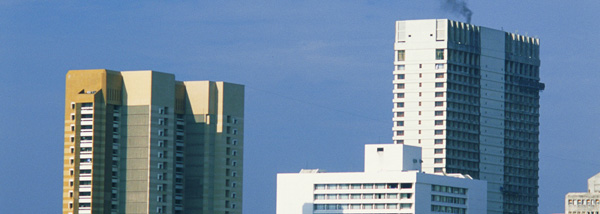Despite Globalization, Lawyers Find New Barriers to Practicing Abroad
Lisa A. Alfaro joined Gibson, Dunn & Crutcher in 1995 after receiving her JD from Stanford Law School. Now she is partner in charge of the firm’s São Paulo office in Brazil, and she co-chairs the Latin America practice group. She is fluent in Portuguese and Spanish, and she is licensed in California and New York.
But there is one thing Alfaro can’t do: engage in any kind of local law practice in Brazil.
As a registered foreign legal consultant, Alfaro may advise her clients—primarily multinational companies—on U.S. and international law relating to such things as mergers and acquisitions, and project finance.
But under rules promulgated by Brazil’s national bar association, she is barred from giving clients any advice on Brazilian law, even though she is well-versed in it.
“The fact that we can’t practice locally is certainly the largest challenge we face,” says Alfaro. “I make it clear to each client that they have to talk to the Brazil counsel about an issue, even if I am up-to-date on the law.”
And now it might become even more difficult for foreign lawyers like Alfaro to work closely with local counsel.

Illustration by Stephen Ravenscraft
In February, the São Paulo chapter of Brazil’s national bar association affirmed an opinion, first issued in 2010, that it is unethical for Brazilian lawyers to create any kind of formal alliance with foreign legal consultants. The opinion concludes that those consultants are not actually lawyers under Brazilian regulations, so alliances with them would violate Brazil’s ban on multidisciplinary practice. If the national bar endorses the opinion, any alliances between local and foreign law firms likely would be dissolved. Clients would have to go to local firms for advice on Brazilian law, while foreign firms could only give advice on non-Brazilian law.
“Nobody’s really sure what’s going to happen,” says Alfaro, whose firm is not formally allied with any lawyers in Brazil. “People are still waiting to see what it means.”

Photo of Brasilia, Brazil by Dida Sampaio/Agencia Estado/AE via AP Images
THE WALLS GO UP
In today’s global economy, the practice barriers Alfaro faces in Brazil are becoming increasingly common for lawyers following clients and business opportunities around the world. U.S. law firms face an increasingly competitive—and often protectionist—legal environment when they seek to extend their operations overseas. This environment also is raising new questions about how lawyers should be regulated outside their home jurisdictions.
“Globally, major markets are opening up. The outside world is banging at the doors of just about every country in the world,” says Glenn P. Hendrix, managing partner at Arnall Golden Gregory in Atlanta and chair of the ABA Task Force on International Trade in Legal Services.
“The question is, how does the local legal profession respond?” says Hendrix, a past chair of the ABA Section of International Law. “Every country is asking the big questions: ‘Is globalization a threat or an opportunity? If we liberalize rules of practice for foreign lawyers, does it help or hurt us?’ ”
So far, there is no clear answer to that question. Some countries, like Canada, allow lawyers from the United States and other jurisdictions to practice within their boundaries with relative ease. Recent changes in the regulatory structures for lawyers in the United Kingdom and Australia also may prove to be beneficial for lawyers from other countries. And some countries, including Singapore, South Korea, Switzerland and even Mongolia, are actively seeking ways to make their court systems more inviting to foreign lawyers and their clients as a way to help build their economies.
Other nations, however, are standing firm at the ramparts in their efforts to block—or at least minimize—incursions by lawyers from other jurisdictions.
The United States—the world’s largest national economy—falls somewhere in the middle of the spectrum. There has been movement in recent years to allow foreign lawyers to practice at least on a temporary basis and subject to restrictions; but the rules vary from state to state, and some jurisdictions are not as welcoming to foreign practitioners as others.
“Multiple jurisdictions, multiple rules complicate the process for the foreign lawyer,” says Robert E. Lutz, a professor at Southwestern Law School in Los Angeles. He is a past chair of the ABA’s International Law Section who now serves on the international trade task force.
The current state of U.S. regulation of foreign lawyers typifies the situation in much of the world. Lawyers are venturing into the international legal marketplace without the benefit of a uniform regulatory system or a universal code of ethics. As a result, it often is unclear which national or local rules govern foreign lawyers, especially when a complex transaction involves clients and lawyers from multiple jurisdictions, says Laurel S. Terry, a law professor at Penn State University in Carlisle who is an expert on international regulation of the legal profession.
“It’s not a complete no man’s land, but it’s pretty close to that,” Terry says. “The reality is that client needs and lawyer practices are far ahead of the regulatory structure.”
FROM THEORY TO PRACTICE
There appears to be growing recognition among practitioners and regulation experts both in the United States and abroad that the time has come to address these issues.
“For years, people talked about the globalization of legal services, but now we’ve moved from the very theoretical to the very real,” says Paul D. Paton, a professor and director of the Ethics Across the Professions Initiative at the University of the Pacific’s law school in Sacramento, Calif.
Paton also serves as a reporter for the ABA Commission on Ethics 20/20, which is studying the impact of technology and globalization on professional conduct rules for lawyers in the United States. The commission plans to submit proposed revisions to the ABA Model Rules of Professional Conduct for consideration by the association’s policymaking House of Delegates in August at the 2012 annual meeting in Chicago.
The Ethics 20/20 Commission was created by Carolyn B. Lamm in one of her first actions after becoming ABA president in August 2009. “We need to review our system of legal governance and ethical regulations to keep up with a changing world,” wrote Lamm, a partner at White & Case in Washington, D.C., in her column in the September 2009 ABA Journal. “The practice of law is far more global in reach than it was when many of us entered the profession. While the explosion of new technology and its ever-expanding global reach has created a number of valuable opportunities for the legal profession, we must ensure that our current ethics rules and regulatory regime are keeping up with our needs.”
Significantly, some of the most restrictive policies toward foreign lawyers exist in four of the world’s largest and fastest-growing national economies, as measured by gross domestic product. They are the so-called BRIC countries: Brazil (the world’s eighth-largest economy, according to the World Factbook produced by the CIA); Russia (sixth); India (fourth); and China (second). Many economics experts forecast that China will supplant the United States as the world’s largest national economy by 2030, with India replacing Japan in third place.
Generally, lawyers handle the logistics of representing clients in multinational matters in one of two ways. In some cases, lawyers represent clients on a “fly in, fly out” basis—FIFO in the jargon of frequent business travelers—while others set up shop in a foreign jurisdiction more or less permanently.

Photo of Mumbai, India by Dinodia via AP Images
But India does not allow foreign law firms to set up offices within its borders, says Erik B. Wulff, a partner at DLA Piper in Washington, D.C., who is a past co-chair of the India Committee in the ABA’s International Law Section. In addition, Wulff says, there is a question as to whether foreign lawyers may practice in any manner, even on a FIFO basis in India.
“We have been seeking to get clarification on this issue,” says Wulff. In the meantime, Wulff does most of his work relating to India from a remote location. He says most foreign lawyers do their business relating to India from offices in places like Singapore or Dubai.
Like Brazil and India, China has shown reluctance to ease restrictions on foreign lawyers.
Qian Huang, who is of counsel in the Washing ton, D.C., office of SNR Denton, travels to China often to help corporate clients on investment and patent enforcement matters. But Huang, a lawyer educated and licensed in the United States who speaks Mandarin, can’t officially practice Chinese law. To file court papers or advise on the particulars of Chinese law, her firm must affiliate with a Chinese law firm.
But it is difficult for U.S. firms to hire Chinese lawyers, Huang says. When Chinese lawyers do choose to work for U.S. firms, they are required to relinquish their licenses at least temporarily.
“What happens is that you can’t keep the good Chinese lawyers at a firm. Clearly, it’s not a career path for them,” says Huang.
In Russia, meanwhile, foreign law firms may open offices and hire local lawyers, but the relationship between the local bar and foreign lawyers can be contentious, says R. William “Bill” Ide III, a past ABA president who now chairs the association’s Central European and Eurasian Law Initiative Council.
“It tends to be two steps forward and two steps back sometimes in Russia,” says Ide, a partner at McKenna Long & Aldridge in Atlanta. “Right now, Russia is feeling its oats, and there is a fair amount of resentment toward the U.S.,” he says. “Russians want to do it the Russian way. They have their own pride, and they don’t want Westerners imposing on them the Western way to do things.”
At the same time, foreign lawyers are cautious about the Russian legal system, Ide says. “If you can negotiate dispute resolution outside the country, you will do it,” he says, “because the Russian legal system is still inconsistent. Clients want certainty and predictability, and that’s often hard to get in Russia.”

Photo of St. Petersburg, Russia by AP Photo/Dmitry Lovetsky
One concern sometimes expressed by foreign lawyers about countries with protective practice rules is that local counsel, while versed in the law of their own jurisdiction, may not be well-grounded in the fundamentals of international law.
“Not all lawyers are created equal,” says Erika C. Collins, a partner at Paul Hastings in New York City who chairs the firm’s international employment practice group. “If you are hiring a lawyer in Brazil, that lawyer is probably not an international expert. If you don’t have experience in international issues, then you don’t know what you don’t know.”
The exclusion of foreign lawyers is not, how ever, a universal trend. The United Kingdom and Australia both have recently embraced changes to their regulatory system to allow for more consistent supervision of lawyers.
In the U.K., the Legal Services Act streamlines the regulatory process by giving one independent body oversight of lawyers in England and Wales. The act also allows partnerships between lawyers and nonlawyers, and outside investment in law firms.
A similar scheme was introduced in Australia with the goal of bringing more uniformity to lawyer regulation in the country’s eight states and territories.
“Because of the potential repercussions of changes in the United Kingdom and Australia, the rest of the world is not going to be able to ignore what’s happening there,” says Deborah L. Rhode, director of the Center on the Legal Profession at Stanford Law School.
In Paton’s view, the new regulatory structures in the United Kingdom and Australia raise important questions about how law firms are organized and owned. Among some in the legal profession, “the sense is that, both in the domestic and global marketplace, the traditional law firm structure isn’t nimble enough to respond to global clients’ needs,” Paton says. “Others disagree. That is the essence of the philosophical debate, and it requires us to step back and ask, ‘Who are we as lawyers?’ and ‘What are our responsibilities regarding access to justice?’ ”
CHANGES ON THE WAY
The Ethics 20/20 Commission already has signaled its intention to recommend amendments to the ABA Model Rules of Professional Conduct that would make it easier for lawyers from foreign countries to practice in U.S. jurisdictions, at least temporarily.
At the same time, however, the commission has indicated that, while it is considering the possibility of recommending some form of law firm operating structure that would involve nonlawyers, it does not intend to recommend that outside investment in law firms be permitted. The commission was expected to issue an initial draft recommendation on alternative business structures before the end of this year.
Currently, the District of Columbia is the only jurisdiction in the U.S. that permits lawyers to form partnerships with nonlawyers, and such entities may only engage in the practice of law.
The commission already has disseminated several draft recommendations relating to foreign lawyers before putting them into final versions that will be submitted to the House of Delegates. Those recommendations would:
• Extend the ABA Model Rule for Registration of In-House Counsel (which is separate from the Model Rules of Professional Conduct) to lawyers from foreign countries as well as other U.S. jurisdictions (PDF). Under the rule, a lawyer who registers may provide legal services to the entity client on matters directly related to the lawyer’s work for the entity. The lawyer may not, however, appear in court or before another tribunal, or provide legal services to any other party.
• Extend the ABA Model Rule on Pro Hac Vice Admission to lawyers from foreign jurisdictions (PDF). A lawyer admitted pro hac vice would be supervised by an attorney from the host jurisdiction.
• Revise Rule 5.5 of the Model Rules of Professional Conduct to allow foreign lawyers to engage in temporary practice in U.S. jurisdictions, but with tougher restrictions than apply to lawyers licensed in other U.S. jurisdictions (PDF). (Currently, the provisions governing temporary practice by other U.S. lawyers are contained in the Model Rule for Temporary Practice.)
The commission also is considering proposals to amend Model Rule 8.5 to give lawyers and parties greater discretion to make choice-of-law decisions relating to ethics and discipline matters. The rule says that a lawyer always is subject to the disciplinary authority of a jurisdiction where the lawyer is admitted to practice. A lawyer also is subject to the rules of a jurisdiction in which the lawyer provides legal services, even if the lawyer is not licensed in the jurisdiction. A lawyer may be subject to the disciplinary authority of more than one jurisdiction for the same conduct.
In developing its recommendations, the commission is seeking to strike a balance, says Andrew M. Perlman, a professor at Suffolk University Law School in Boston who serves as chief reporter.
“We want to acknowledge that, in light of a global economy, foreign clients want to have the benefit of their foreign counsel. We acknowledge that clients have the freedom to choose the lawyers they want to help them,” Perlman says. “But we want to make sure that foreign lawyers who are performing work in the U.S. are subject to appropriate limitations that protect both clients and the public.”
Some observers, however, say the recommendations being developed by the Ethics 20/20 Commission may be too limited. Without more dramatic changes to the lawyer regulation system in the United States, they say, this country’s legal profession may soon find itself at a severe competitive disadvantage. A particular focus of their concern is the complexity of a system in which lawyers are regulated by a patchwork of jurisdictions made up primarily of the 50 states and the District of Columbia.
“There is no question that, in the long run, the American profession will be more and more at a competitive disadvantage answering clients’ global and international needs because of the Byzantine patchwork of regulations locally,” says Anthony E. Davis, a partner at Hinshaw & Culbertson in New York City. “The solution is to replace our existing regulatory patchwork with a single national regulator and uniform rules of professional conduct.”
Davis cites the British Legal Services Board, which oversees local legal bar regulators, as an “interesting model.” A U.S. equivalent organization could have the “power to tell states that they have to stop with all the turf protection games,” he says.
Terry suggests that the legal profession may have little choice but to adopt drastic changes in its regulatory structure.
“Globalization is here to stay. Technology is going to radically change the way that lawyers work,” says Terry. “We are going to have to rethink what lawyers offer and what our services look like. If our regulatory structure can’t adapt, it could get displaced.”
But even advocates of change acknowledge that trying to replace the current state-based system of lawyer regulation with a more centralized approach would trigger fierce opposition.
It’s also hard to tell whether the centralized model being pursued in the United Kingdom and Australia will have much appeal in other jurisdictions. “A number of law organizations are trying to come up with rules that will clarify which regulator might have control,” Lutz says. “It’s unclear if other countries would be comforted by having a uniform rule. They may accept it. They may reject it.”

Photo of Tokyo, Japan by AP Photo/Koji Sasahara
WHOSE RULE RULES?
If there were a search for one dilemma that best illustrates the confusion being caused by the continuing globalization of legal work, the issue of which jurisdiction’s rules should govern the actions of lawyers is a pretty good candidate.
When lawyers operating on a global basis jump across traditional jurisdictional boundaries, it isn’t always clear what legal rules apply and which jurisdiction’s ethical regulations are binding.
“Now you can be sitting on a beach in Belize conducting an international transaction by email with other international lawyers in multiple countries to effectuate a deal,” Lutz says. “The answer to who regulates your conduct is not automatically apparent.”
Brigitte R. Gambini is a partner at Duane Morris in New York City, where she is a registered legal consultant. She is admitted to practice in Paris.
Gambini says she has yet to face a situation in which her license to practice in France directly conflicted with New York state’s conduct code for lawyers in a particular situation. But that doesn’t mean it won’t happen someday, she says.
“And when that happens, you are in a catch-22,” says Gambini, a vice-chair of the Foreign Legal Consultant Committee in the ABA’s International Law Section. “To be in compliance with your own bar, you have to follow their rules. To maintain your legal consultant status in New York, you can’t violate your professional bar rules. So what do you do? You defer to your own bar and ask them for guidance.”
Gambini notes that, as a matter of principle, when a lawyer faces two rules that are in conflict, yet has to comply with both, the best move is to apply the more stringent rule.
Terry says the problem may become most evident in the environment of international tribunals. Her research has identified problems arising when the ethics boundaries under which a U.S. lawyer operates directly conflict with the rules under which the opposing lawyer is bound.
“In some jurisdictions, it is improper or illegal to prepare a witness ahead of time. In ours, it would be negligent not to do so,” Terry says. “So what do you do? It’s fair to say that lawyers from different jurisdictions with different rules, different cultural understandings about acceptable behavior and different understandings about what conduct is appropriate and ethical are going to have problems.”
Generally, Hendrix says, there are a few possible approaches as to which ethics rules should apply to foreign lawyers. In the context of international arbitration, for instance, some experts advocate a global code of ethics to govern the behavior of lawyers.
But others say that a lawyer licensed in a particular jurisdiction should follow that jurisdiction’s rules wherever the lawyer goes. And yet another approach would apply to foreign lawyers the rules of the jurisdiction in which the arbitration is being conducted.
Terry says the confusion over these and other conduct questions will only deepen until some form of uniform international regulatory system begins to take shape. “All lawyers have a stake in coming up with a regulatory system that focuses appropriately on protection of the client and facilitating access to justice,” says Terry. “We need an international system that can function effectively in this very mobile, very global, very technology-oriented world that we live in.”
Anna Stolley Persky is a freelance writer based in Washington, D.C.



